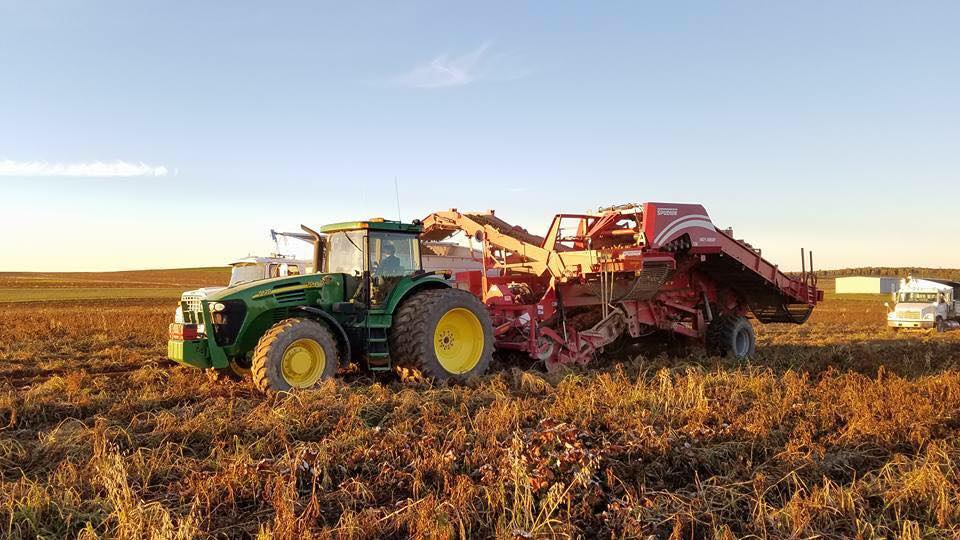[deck]Finding the right help at planting and harvest can be a challenge.[/deck]
No two Canadian potato operations have the same challenges. Coast to coast, the problems and opportunities facing producers vary widely based on geography and markets.
But one problem might be a little more common than others: finding the right seasonal help during the two busiest times of year – planting and harvest.
In New Brunswick, a shortage of skilled workers has been a problem for years, says Paul Leahey, who has managed Potatoes New Brunswick’s potato harvest hotline, along with Iain Dunlop, for 12 years.
New Brunswick’s potato farms largely rely on local labour pools, but these are diminishing. Several years ago, the eastern provinces jettisoned “potato break,” which allowed children of farming families to take time off school and help with harvest. The local workforce is aging and many truck drivers are retirees.
Enter the potato harvest hotline, which connects labourers across the province – some from other industries such as peat moss and fishing – with farmers looking for help.
But it isn’t just that helping hands are hard to find. Another problem, Leahey says, is that many workers lack training in necessary skills. Over the last decade, Leahey and Dunlop have helped over 1,000 people get their truck driving licenses in New Brunswick. The program, which started when Leahey and Dunlop noticed many drivers didn’t have air brake certification, has expanded over the years.
“We need around 4,000 trucks to bring the harvest in in the province, and these people have to be certified to drive the trucks, but some of them may not be,” says Leahey.
“Definitely it’s a worry for some producers – they put their livelihood in the ground in the spring, and if you don’t have a good labour supply, it can be a really tough job. Farmers would rather have more help than less help.”
Seasonal Agricultural Workers
In Prince Edward Island, growers are having similar problems, says Greg Donald, P.E.I. Potato Board general manager.
All three of the Island’s main industries – agriculture, fisheries and tourism – compete for seasonal labour, and the local workforce is aging.
“When those aging workers retire it’s harder to attract new people and younger people to do those jobs. It’s becoming an increasing challenge here on P.E.I.,” says Donald.
P.E.I.’s potato farmers are supported by the P.E.I. Agriculture Sector Council, which offers seasonal employment services for all agricultural sectors, including agricultural technician training and a seasonal help hotline. The province’s potato board also supports the government’s Seasonal Agricultural Worker Program (SAWP) which helps farmers hire workers from Mexico and the Caribbean on eight-month visas.
Donald says the number of operations hiring through the SAWP is still limited largely to those that have packing facilities and can offer work beyond the two- to three-week harvest period. “But it’s increasing in prevalence and I predict it will continue to increase because of our inability to replace aging seasonal workers,” he notes.

Alvin Keenan is a potato farmer on P.E.I. and president of the Horticultural Council of Canada. His farm is a family operation that produces fresh market potatoes; it also runs a packing facility.
Keenan has hired local labourers as well as temporary foreign workers through the SAWP when help can’t be sourced locally. The process can be onerous – he says farmers need to start the process six months in advance and the paperwork is extensive.
“We end up applying for labour to harvest our crops before we’ve even planted the crops,” he says.
Overall, the program works well. But Keenan says there can be occasional hiccups that make life difficult, such as when workers have to return home for family or other emergencies, leaving vacancies that can’t easily be filled.
Slow Summer Months
In Ontario, many potato producers have trouble finding skilled operators, unless their operations are diversified enough that there’s enough work to go around even in the usually slow summer months.
Shawn Brenn, owner of Brenn-B Farms, says the SAWP works extremely well for his mixed vegetable operation. He grows potatoes as well as leafy greens, which creates a heavy workload throughout the growing season.

In the past Brenn’s farm had access to operators who were from farming families and thus tremendously skilled, he says. Fresh graduates, on the other hand, often understand the technology, “but they don’t understand what it’s like to work a field and the way the field should be in terms of soil structure and moisture,” he says. Added to this, young people often don’t want to do field labour for entry-level wages.
Currently, Brenn has 44 Mexican workers on his operation, totalling over half of his summer workforce. “Some workers here from Mexico have watched me grow up and are now watching my kids grow up,” he says. “It works for them and for us. We’re so diversified here with our crop portfolio that there’s work even in summer months.”
On most potato operations, the lack of work in those in-between months means farmers can’t justify bringing workers in through the SAWP.
In Manitoba, some producers hire migrant labourers who come to the province for the vegetable season, according to Dan Sawatzky, general manager of Keystone Potato Producers Association. These labourers can transfer from other farms to work on potato farms for the harvest period at the end of their contracts. Another pool of workers comprises what Sawatzky calls “adventure labourers,” younger temporary workers from Europe and Australia.
But most Manitoba growers hire local labourers, including recent immigrants with landed status who work in other industries, such as hog processing, for part of the season, and move to potatoes during harvest.
The biggest hiring problems for Manitoba potato farmers hit when the season gets extended, says Sawatzky.
“A lot of farms are able to find truck drivers and equipment operators who can take time off of their current jobs – they’ll take a two- to three-week holiday during that window and help out. But when the season gets extended they run out of holiday time.”
Diversified Workforce
In Alberta, a diversified workforce means producers rarely have problems finding seasonal help, says Terence Hochstein, Potato Growers of Alberta executive director.

A large Mexican Mennonite population either lives in Alberta year-round, or leaves for other work during the winter and returns for the summer months.
Extended harvest seasons can create problems in Alberta too, but this problem is eased by the fact many workers move between industries or agricultural sectors, and help out on potato farms during planting and harvest.
“Large families are also a big factor in our area,” notes Hochstein. “Especially in the Dutch community, we have many large multi-generational families. That’s a huge contributing factor here.”
Relying on a diversified workforce seems to be at least part of the answer to seasonal labour shortages. But this means producers need to be connected to as many labour pools as possible – and open to exploring new networks of potential workers.
The P.E.I. Potato Board’s Donald believes the industry could be doing more to attract and retain skilled workers.
This starts with communication. Farmers are not always leaders in communicating the opportunities available within the industry, says Donald, in order to attract a young and highly skilled workforce to jobs many of them might actually love.
“As an industry we need to do a better job of letting the general public know of all the unique opportunities in our industry,” he says. “It’s pretty exciting outdoor work with some pretty neat technology.
“Communicating the types of jobs and careers that people can have in agriculture is something we all need to work at.”











